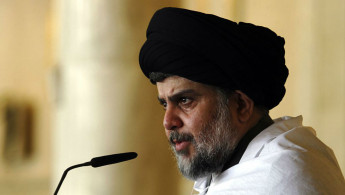Leading Iraqi Shia cleric Sadr heads to Riyadh for official state visit
An outspoken Iraqi Shia cleric will visit Saudi Arabia to meet with Saudi Crown Prince Mohammed bin Salman after receiving an official invitation from Riyadh, Iraqi parliamentary sources have said.
The private office of Moqtada al-Sadr had announced in a short statement on Saturday that the popular cleric was heading to Saudi Arabia for an "official visit".
An Iraqi source close to Sadr's political party told The New Arab that the cleric will be accompanied by a delegation of allied Shia religious leaders and politicians from the Sadrist Movement.
"Sadr received the invitation from the Saudi Royal Court to visit Riyadh mid-last month through Iraq's ambassador to Saudi Arabia, Rushdi al-Ani," the source said.
He added that the commander of Sadr's Peace Companies paramilitary force, Abu Duaa al-Issawi, would take part in the trip.
An Iraqi lawmaker said that Sadr will meet with Saudi Crown Prince Mohammed bin Salman, who was named heir to the region's most powerful throne last month, as well as Saudi religious leaders.
"The talks will focus on issues related to Iraq under Riyadh's new policy of openness to Iraq's Shias," the parliamentarian said.
Relations between Baghdad and Riyadh were only restored recently since their severing in 1990 following former dictator Saddam Hussein's invasion of Kuwait.
The Saudi embassy was reopened in Baghdad for the first time in 25 years in early 2016.
A few months later, Baghdad asked Riyadh to replace its ambassador, Thamer al-Sabhan, after he urged Iraq to exclude the Shia-majority Hashed al-Shaabi Popular Mobilisation paramilitaries from the war against the Islamic State group.
The popular cleric has called for Sunni-ruled Saudi Arabia to engage in "serious dialogue" with Shia rival Iran to avoid a potential sectarian war.
His supporters have staged large protests in Baghdad calling for tougher measures against corruption, reform of the electoral law and a new government run by technocrats instead of political party leaders and their cronies, whom they blame for much of the country's woes.
Sadr also called for the government to disband the powerful Iranian-backed militias, which have been accused of carrying out sectarian violence in areas recaptured from IS.
Saudi Arabia's Shia minority, who are estimated at around ten percent of the population, have long complained of marginalisation by Sunni authorities.





 Follow the Middle East's top stories in English at The New Arab on Google News
Follow the Middle East's top stories in English at The New Arab on Google News
![The UAE is widely suspected of arming the RSF militia [Getty]](/sites/default/files/styles/image_330x185/public/2024-11/GettyImages-472529908.jpg?h=69f2b9d0&itok=Yauw3YTG)
![Netanyahu furiously denounced the ICC [Getty]](/sites/default/files/styles/image_330x185/public/2024-11/GettyImages-2169352575.jpg?h=199d8c1f&itok=-vRiruf5)
![Both Hamas and the Palestinian Authority welcomed the ICC arrest warrants [Getty]](/sites/default/files/styles/image_330x185/public/2024-11/GettyImages-2178351173.jpg?h=199d8c1f&itok=TV858iVg)